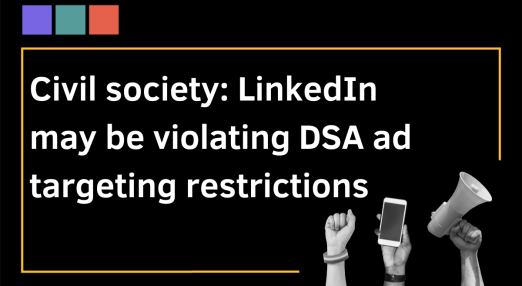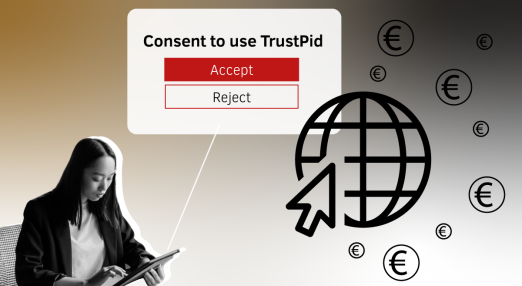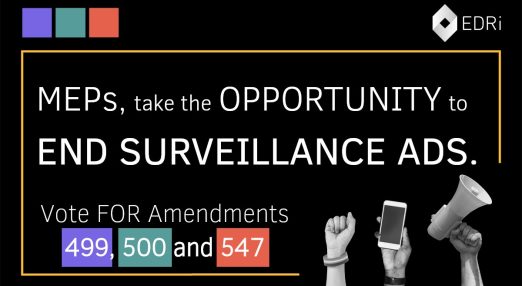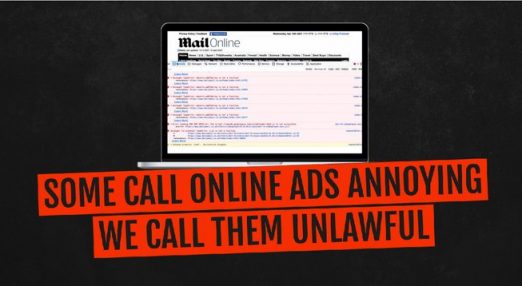advertising
Filter by...
-

Civil society complaint raises concern that LinkedIn is violating DSA ad targeting restrictions
On 26 February, EDRi and its partners Global Witness, Gesellschaft für Freiheitsrechte and Bits of Freedom have submitted a complaint to the European Commission regarding a potential infringement of the Digital Services Act (DSA).
Read more
-

Open letter: EU Lawmakers must uphold human rights to privacy and free expression in the Political Ads Regulation
EDRi and 26 civil society organisations, voice our deep concern regarding the worrying developments related to the Regulation on the Targeting and Transparency of Political Advertising.
Read more
-

TrustPid: Baking ad tracking into the internet infrastructure
A consortium of Europe’s largest telecommunications operators (telcos) has proposed a new kind of tracking ads system to challenge commercial surveillance heavyweights like Google and Facebook. The new tracking system, misleadingly dubbed ‘TrustPid’, would be baked into the internet’s network infrastructure – potentially with little recourse or defence for users.
Read more
-

European Parliament approves a timid online political advertising proposal
Tomorrow, 2 February, the European Parliament will vote on the regulation on the transparency and targeting of political advertising proposal in plenary. Although this regulation intended to restrict the use of personal data to target online political advertisements, important proposals to tackle the root causes of data-driven vote manipulation were watered down during the discussion in the Parliament.
Read more
-

Gmail creates “Spam Emails”, despite CJEU judgment
On 24 August, EDRi member noyb.eu filed a complaint against Google with the French Data Protection Authority (CNIL). The tech giant has repeatedly ignored the European Court of Justice (CJEU) ruling on direct marketing emails and used its email platform Gmail to send unsolicited advertising emails without valid consent of the users.
Read more
-

People ask MEPs: Take the opportunity, end surveillance ads!
Thousands of people are asking the EU Parliament to end online surveillance advertising , ahead of the DSA (Digital Services Act) vote in the plenary on Thursday, 20 January 2022. EDRi is part of the movement mobilising people, together with individual organisations in the PeopleVsBigTech group and beyond.
Read more
-

Algorithms of trauma: New case study shows that Facebook doesn’t give users real control over disturbing surveillance ads
A case study examined by Panoptykon Foundation, EDRi’s member in Poland, and showcased by the Financial Times, demonstrates how Facebook uses algorithms to deliver personalised ads that may exploit users’ mental vulnerabilities.
Read more
-

EDRi joins the Tracking-Free Ads Coalition in the European Parliament
Today, European Digital Rights (EDRi) together with 25+ other organisations joins the Tracking-Free Ads Coalition, led by Members of the European Parliament, as supporters. The coalition is made up of a group of 19 Members of European Parliament committed to ending the pervasive tracking and data mining that has poisoned online advertising across every corner of the internet.
Read more
-
Booklet: How online ads discriminate
The risks and harms that are associated with hyper-targeted online ads have been widely documented. Yet, the same amount of attention has not been shown to the many ways in which harms and risks of online advertising are unequally distributed, and how targeted online advertising can have discriminatory effects. This is the focus of EDRi’s newly launched report.
Read more
-

FLoC: Google’s new means of following you across the web
If you browse the web without an ad blocker, you will have noticed that the ads you see tend to follow you around. Have you been looking around for a new pair of shoes? Be prepared to see more ads for shoes on completely unrelated websites. This advertising technique is called "behavioural retargeting" and is built on recording your web history in a central place, then using that information to select ads that advertisers expect you are more likely to react to. In this article. EDRi's member epicenter.works sheds some light on Google's new way of tracking users across the web.
Read more
-

Four measures to limit the dominance of platforms like YouTube and Facebook
For our public debate, we are far too dependent on the whims of dominant companies such as Google and Facebook. The time is nigh for politicians to step in, and here are four measures they should take.
Read more
-

AdTech is watching you!
The reality is that AdTech target mothers who just had stillbirths with baby ads, and serial gamblers who are trying to quit with gambling ads, or simply send creepy ads.
Read more
